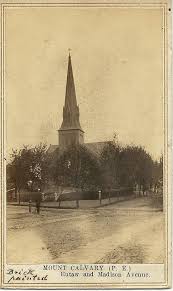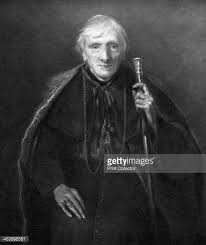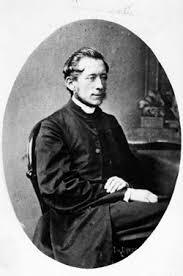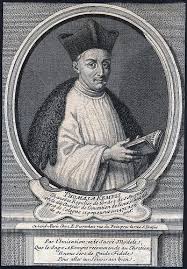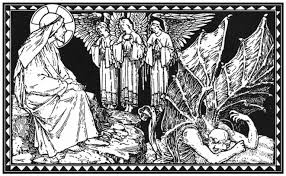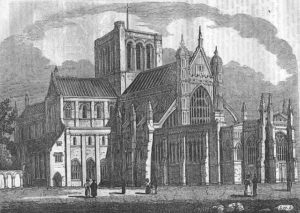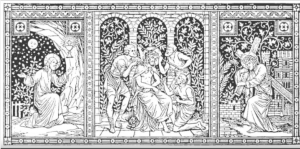Mount Calvary Church
Baltimore
Personal Ordinariate of the Chair of St. Peter
Lent I
March 5, 2017
__________
Hymns
Praise to the Holiest in the height
O Love how deep, how broad, how high
Forty days and forty nights
Anthems
Lord, we beseech thee, by Adrian Batten
The Lenten Prose (Attende Domine), plainchant
Common of Mass
Kyrie, Sanctus, Agnus Dei, Merbecke
____________________
Praise to the Holiest in the height, by John Henry Newman (1865). Like the hymn Firmly I believe and truly, it forms part of The Dream of Gerontius, which describes the passage of the soul through death. It is sung by the angels as the soul approaches judgment. Jesus, who is true God and true man, undergoes for the human race the “double agony,” the one in the garden and the one on the cross. In his Discourse 16, Newman placed equal emphasis on Jesus’ Agony in the Garden and on His Crucifixion as central to understanding the work of redemption. In the garden Jesus felt the full horror and degradation of all the sins and guilt and sorrows of the world. Newman also intimates that we his brethren should learn from Him to do our share in bearing the burden of the sins of the world.
From Newman’s Discourse 16:
“And now, my brethren, what was it He had to bear, when He thus opened upon His soul the torrent of this predestinated pain? Alas! He had to bear what is well known to us, what is familiar to us, but what to Him was woe unutterable. He had to bear that which is so easy a thing to us, so natural, so welcome, that we cannot conceive of it as of a great endurance, but which to Him had the scent and the poison of death—He had, my dear brethren, to bear the weight of sin; He had to bear your sins; He had to bear the sins of the whole world.
Sin is an easy thing to us; we think little of it; we do not understand how the Creator can think much of it; we cannot bring our imagination to believe that it deserves retribution, and, when even in this world punishments follow upon it, we explain them away or turn our minds from them. But consider what sin is in itself; it is rebellion against God; it is a traitor’s act who aims at the overthrow and death of His sovereign; it is that, if I may use a strong expression, which, could the Divine Governor of the world cease to be, would be sufficient to bring it about. Sin is the mortal enemy of the All-holy, so that He and it cannot be together; and as the All-holy drives it from His presence into the outer darkness, so, if God could be less than God, it is sin that would have power to make Him less.
And here observe, my brethren, that when once Almighty Love, by taking flesh, entered this created system, and submitted Himself to its laws, then forthwith this antagonist of good and truth, taking advantage of the opportunity, flew at that flesh which He had taken, and fixed on it, and was its death. The envy of the Pharisees, the treachery of Judas, and the madness of the people, were but the instrument or the expression of the enmity which sin felt towards Eternal Purity as soon as, in infinite mercy towards men, He put Himself within its reach. Sin could not touch His Divine Majesty; but it could assail Him in that way in which He allowed Himself to be assailed, that is, through the medium of His humanity. And in the issue, in the death of God incarnate, you are but taught, my brethren, what sin is in itself, and what it was which then was falling, in its hour and in its strength, upon His human nature, when He allowed that nature to be so filled with horror and dismay at the very anticipation.
There, then, in that most awful hour, knelt the Saviour of the world, putting off the defences of His divinity, dismissing His reluctant Angels, who in myriads were ready at His call, and opening His arms, baring His breast, sinless as He was, to the assault of His foe,—of a foe whose breath was a pestilence, and whose embrace was an agony. There He knelt, motionless and still, while the vile and horrible fiend clad His spirit in a robe steeped in all that is hateful and heinous in human crime, which clung close round His heart, and filled His conscience, and found its way into every sense and pore of His mind, and spread over Him a moral leprosy, till He almost felt Himself to be that which He never could be, and which His foe would fain have made Him.
Oh, the horror, when He looked, and did not know Himself, and felt as a foul and loathsome sinner, from His vivid perception of that mass of corruption which poured over His head and ran down even to the skirts of His garments! Oh, the distraction, when He found His eyes, and hands, and feet, and lips, and heart, as if the members of the Evil One, and not of God! Are these the hands of the Immaculate Lamb of God, once innocent, but now red with ten thousand barbarous deeds of blood? are these His lips, not uttering prayer, and praise, and holy blessings, but as if defiled with oaths, and blasphemies, and doctrines of devils? or His eyes, profaned as they are by all the evil visions and idolatrous fascinations for which men have abandoned their adorable Creator? And His ears, they ring with sounds of revelry and of strife; and His heart is frozen with avarice, and cruelty, and unbelief; and His very memory is laden with every sin which has been committed since the fall, in all regions of the earth, with the pride of the old giants, and the lusts of the five cities, and the obduracy of Egypt, and the ambition of Babel, and the unthankfulness and scorn of Israel.
Oh, who does not know the misery of a haunting thought which comes again and again, in spite of rejection, to annoy, if it cannot seduce? or of some odious and sickening imagination, in no sense one’s own, but forced upon the mind from without? or of evil knowledge, gained with or without a man’s fault, but which he would give a great price to be rid of at once and for ever? And adversaries such as these gather around Thee, Blessed Lord, in millions now; they come in troops more numerous than the locust or the palmer-worm, or the plagues of hail, and flies, and frogs, which were sent against Pharaoh. Of the living and of the dead and of the as yet unborn, of the lost and of the saved, of Thy people and of strangers, of sinners and of saints, all sins are there…..
None was equal to the weight but God; sometimes before Thy saints Thou hast brought the image of a single sin, as it appears in the light of Thy countenance, or of venial sins, not mortal; and they have told us that the sight did all but kill them, nay, would have killed them, had it not been instantly withdrawn. The Mother of God, for all her sanctity, nay by reason of it, could not have borne even one brood of that innumerable progeny of Satan which now compasses Thee about.
It is the long history of a world, and God alone can bear the load of it. Hopes blighted, vows broken, lights quenched, warnings scorned, opportunities lost; the innocent betrayed, the young hardened, the penitent relapsing, the just overcome, the aged failing; the sophistry of misbelief, the wilfulness of passion, the obduracy of pride, the tyranny of habit, the canker of remorse, the wasting fever of care, the anguish of shame, the pining of disappointment, the sickness of despair; such cruel, such pitiable spectacles, such heartrending, revolting, detestable, maddening scenes; nay, the haggard faces, the convulsed lips, the flushed cheek, the dark brow of the willing slaves of evil, they are all before Him now; they are upon Him and in Him. They are with Him instead of that ineffable peace which has inhabited His soul since the moment of His conception.
They are upon Him, they are all but His own; He cries to His Father as if He were the criminal, not the victim; His agony takes the form of guilt and compunction. He is doing penance, He is making confession, He is exercising contrition, with a reality and a virtue infinitely greater than that of all saints and penitents together; for He is the One Victim for us all, the sole Satisfaction, the real Penitent, all but the real sinner.”
Praise to the Holiest in the height,
and in the depth be praise:
in all his words most wonderful,
most sure in all his ways.O loving wisdom of our God!
When all was sin and shame,
a second Adam to the fight
and to the rescue came.O wisest love! that flesh and blood,
which did in Adam fail,
should strive afresh against the foe,
should strive and should prevail;And that a higher gift than grace
should flesh and blood refine,
God’s presence and his very self,
and essence all-divine.O generous love! that he, who smote
in Man for man the foe,
the double agony in Man
for man should undergo;And in the garden secretly,
and on the cross on high,
should teach his brethren, and inspire
to suffer and to die.Praise to the Holiest in the height,
and in the depth be praise:
in all his words most wonderful,
most sure in all his ways.
The tune Gerontius is by the colorful John Bacchus Dykes (1823—1876).
John Bacchus Dykes
Although his paternal grandfather and his father had been firmly of an evangelical persuasion, Dykes migrated to the Anglo-Catholic, ritualist, wing of the Church of England during his Cambridge years. Although never a member of the Cambridge Camden Society, his later life showed him to be clearly in sympathy with its central tenets, as he was with those of the Oxford Movement. He was a member of the Society of the Holy Cross. At this time, antagonism between the evangelical and Anglo-Catholic wings of the Church of England was heated and sometimes violent.
Although Dykes’s treatment at the hands of the evangelical party, which included his own Bishop, Charles Baring, was largely played out locally, Baring’s refusal to licence a curate to help the overworked Dykes in his ever-expanding parish, led the latter to seek from the Court of Queen’s Bench a writ of mandamus, requiring the Bishop to do so. Against the expectations of many senior legal figures, including the Attorney General, Dr. A.J. Stephens QC, whose services Dykes had retained, the Court, led by puisne judge Sir Colin Blackburn QC, refused to interfere in what they saw to be a matter of the Bishop’s sole discretion.[19] Dykes’s defeat was followed by a gradual deterioration in his physical and mental health, necessitating absence (which was to prove permanent) from St. Oswald’s from March 1875. Rest and the bracing Swiss air proving unavailing, Dykes eventually went to recover on the south coast of England where, on 22 January 1876, he died aged 52. Touchingly, he shares a grave with his youngest daughter, Mabel, who died, aged 10, of scarlet fever in 1870.
Dykes published numerous sermons, book reviews and articles on theology and church music, many of them in the Ecclesiastic and Theologian. These display considerable erudition and wit (not to mention a penchant for damnation by faint praise and a fondness for litotes and gentle sarcasm), especially on the topics of the Apocalypse, the Psalms, Biblical numerology and, unsurprisingly, the function of music and ritual in the service of the church. However, he is best known for over 300 hymn tunes he composed. Lux Benigna, set to Newman’s poem Lead, Kindly Light.
Whereas evolving tastes in music have seen an inexorable decline in the use of Victorian hymn tunes generally, including those by Sir Arthur Sullivan, Sir John Stainer, Sir Joseph Barnby and Lowell Mason, some of Dykes’s tunes have proved remarkably resilient, continuing to find a place in twenty-first century hymnals.
Here is a stirring rendition with brass.
__________________
O Love, how deep, how broad, how high, strongly resembles the writings of Thomas a Kempis (1380-1471), author of The Imitation of Christ. The hymn emphasizes the pro nobis: that all the actions of Christ were done, not for Himself, but for us and for out salvation.
O love, how deep, how broad, how high,
beyond all thought and fantasy,
that God, the Son of God, should take
our mortal form for mortals’ sake!For us baptized, for us he bore
his holy fast and hungered sore;
for us temptation sharp he knew,
for us the tempter overthrew.For us he prayed; for us he taught;
for us his daily works he wrought:
by words and signs and actions thus
still seeking not himself, but us.For us to evil power betrayed,
scourged, mocked, in purple robe arrayed,
he bore the shameful cross and death;
for us gave up his dying breath.For us he rose from death again;
for us he went on high to reign;
for us he sent his Spirit here
to guide, to strengthen, and to cheer.All glory to our Lord and God
for love so deep, so high, so broad —
the Trinity, whom we adore
forever and forevermore.
The translator was by the Anglican clergyman Benjamin Webb (1819—1885). Webb was one of the Founders of the Cambridge Camden, afterwards the Ecclesiological Society; in 1848 he was joint editor with Dr. Mill of Frank’s Sermons, for the Anglo-Catholic Library, and with the Rev. J. Fuller-Russell of Hierurgia Anglicana. He was also one of the editors of the Burntisland reprint of the Sarum Missal. One of his most valuable works is Instructions and Prayers for Candidates for Confirmation, of which the third edition was published in 1882. Mr. Webb was one of the original editors of the Hymnal Noted, that is, with the music, and of the sub-Committee of the Ecclesiological Society, appointed to arrange the words and the music of that book; and was also the translator of some of the hymns. In conjunction with the Rev. Canon W. Cooke he was editor of the Hymnary, 1872.
The tune Deus tuorum was published in France in the 1753 Grenoble Antiphoner as a setting for the text “Deus tuorum militum” (“The God of Your Soldiers”). One of the finest French diocesan tunes from the eighteenth century, it represents a departure in Roman Catholic hymnody from the older chant style.
Here it is sung at Trinity College, Cambridge.
___________________
Forty days and forty nights is by the Anglican clergyman George Hunt Smyttan (1822-1870). Forty often symbolizes a time of testing or judgment. In the Old Testament, when God destroyed the earth with water, He caused it to rain 40 days and 40 nights. After Moses killed the Egyptian, he fled to Midian, where he spent 40 years in the desert tending flocks. Moses was on Mount Sinai for 40 days and 40 nights. Moses interceded on Israel’s behalf for 40 days and 40 nights. The Law specified a maximum number of lashes a man could receive for a crime, setting the limit at 40. The Israelite spies took 40 days to spy out Canaan. The Israelites wandered for 40 years. Before Samson’s deliverance, Israel served the Philistines for 40 years. Goliath taunted Saul’s army for 40 days before David arrived to slay him. When Elijah fled from Jezebel, he traveled 40 days and 40 nights to Mt. Horeb. Jonah warned that in 40 days Nineveh would be destroyed.
Lent is a time of testing and of growth to spiritual maturity. According to the Talmud, at age 40 a person transitions from one level of wisdom to the next. After Moses led the Jewish people for 40 years in the wilderness, he told them: “God has not given you a heart to know, and eyes to see, and ears to hear, until this day.” It took the Jewish people of testing 40 years before they reached a full level of understanding. After 40 days of Lent, we should grow into the full measure of manhood: “Though he were a Son, yet learned he obedience by the things which he suffered; And being made perfect, he became the author of eternal salvation unto all them that obey him.”
Forty days and forty nights
thou wast fasting in the wild;
forty days and forty nights
tempted, and yet undefiled:Sunbeams scorching all the day;
chilly dew-drops nightly shed;
prowling beasts about thy way;
stones thy pillow, earth thy bed.Shall not we thy sorrows share,
and from earthly joys abstain,
fasting with unceasing prayer,
glad with thee to suffer pain?And if Satan, vexing sore,
flesh or spirit should assail,
thou, his vanquisher before,
grant we may not faint nor fail.So shall we have peace divine;
holier gladness ours shall be;
round us too shall angels shine,
such as ministered to thee.Keep, O keep us, Saviour dear,
ever constant by thy side;
that with thee we may appear
at the eternal Eastertide.
George Hunt Smyttan (1822-1870) wrote three poems for Lent, one of which became this hymn. It was published in the March 1856 edition of The Penny Post and was revised five years later in Hymns Fitted to the Order of Common Prayer (1861), by Francis Pott.
The tune Aus der Tiefe (also called Heinlein) was published in the Nürnbergisches Gesang-Buch (1676-77) as a setting for Christoph Schwamlein’s text based on Psalm 130 “Aus der Tiefe rufe ich” (“Out of the Depths I Cry”). In that songbook the tune was attributed to “M. H.,” initials that are generally accepted to refer to Martin Herbst (1654—1681). Herbst was educated in theology and philosophy at the universities of Altdorf and Jena. In 1680 he became he became rector of the gymnasium (high school) and pastor of St. Andrew Church in Eisleben. The following year he died of the plague.
Here it is sung at Compline.
____________________
Lord we beseech thee, by Adrian Batten.
Lord, we beseech thee, give ear unto our prayers, and by thy gracious visitation lighten the darkness of our hearts, by our Lord Jesus Christ. Amen.
Adrian Batten (c. 1591 – c. 1637) was an English organist and Anglican church composer. He was active during an important period of English church music, between the Reformation and the Civil War in the 1640s. During this period the liturgical music of the first generations of Anglicans began to diverge significantly from music on the continent. Among the genres developed during this period by Batten and other Anglican composers was the ‘verse anthem’, in which sections alternate between the full choir and soloists, underlain and unified by an independent organ accompaniment.
Batten was born in Salisbury, and was a chorister and subsequently an organ scholar at Winchester Cathedral, where he studied under John Holmes. Batten remained with the cathedral choir after his voice had changed, as evidenced by graffiti carved into the wall of Bishop Gardiner’s chantry that reads “Adrian Battin: 1608”. In 1614, Batten moved to London to become a Vicar Choral of Westminster Abbey, and was apparently still at Westminster in 1625; The Lord Chamberlain’s Records for 1625 show that at the funeral of James I (at which Orlando Gibbons was organist and master of the music) Batten is described as a “singingman of Westminster”. In 1626, Batten became a Vicar Choral of the cathedral choir at St. Paul’s Cathedral, and also played the organ there.
Here is the anthem at St. Francis Church, Vermont.
____________________
The Lenten Prose is a translation of Attende Domine, a 10th century hymn composed by Mozarabic Christians.
Attende Domine, et miserere, quia peccavimus tibi. Hearken, O Lord, and have mercy, for we have sinned against Thee.
Ad te Rex summe, omnium redemptor, oculos nostros sublevamus flentes: exaudi, Christe, supplicantum preces. R.
Crying, we raise our eyes to Thee, Sovereign King, Redeemer of all. Listen, Christ, to the pleas of the supplicant sinners. R.
Dextera Patris, lapis angularis, via salutis, ianua caelestis, ablue nostri maculas delicti. R.
Thou art at the Right Hand of God the Father, the Keystone, the Way of salvation and Gate of Heaven, cleanse the stains of our sins. R.
Rogamus, Deus, tuam maiestatem: auribus sacris gemitus exaudi: crimina nostra placidus indulge. R.
O God, we beseech Thy majesty to hear our groans; to forgive our sins. R.
Tibi fatemur crimina admissa: contrito corde pandimus occulta: tua Redemptor, pietas ignoscat. R.
We confess to Thee our consented sins; we declare our hidden sins with contrite heart; in Thy mercy, O Redeemer, forgive them. R.
Innocens captus, nec repugnans ductus, testibus falsis pro impiis damnatus: quos redemisti, tu conserva, Christe. R.
Thou wert captured, being innocent; brought about without resistance, condemned by impious men with false witnesses. O Christ keep safe those whom Thou hast redeemed. R.
Here is the Latin with Gregorian chant.
Here is the translation that we are using (English Hymnal 507).
Hear us, O Lord, have mercy upon us: for we have sinned against thee.
To thee, Redeemer, on thy throne of glory:
lift we our weeping eyes in holy pleadings: Listen, O Jesu, to our supplications.O thou chief cornerstone, right hand of the Father:
way of salvation, gate of life celestial:
cleanse thou our sinful souls from all defilement.God, we implore thee, in thy glory seated:
bow down and hearken to thy weeping children:
pity and pardon all our grievous trespasses.Sins oft committed, now we lay before thee:
with true contrition, now no more we veil them:
grant us, Redeemer, loving absolution.Innocent captive, taken unresisting:
falsely accused, and for us sinners sentenced,
save us, we pray thee, Jesu, our Redeemer.Hear us, O Lord, have mercy upon us: for we have sinned against thee.
Her is the Lent Prose at Hereford Cathedral.
